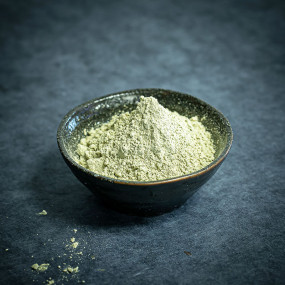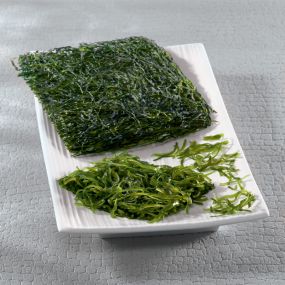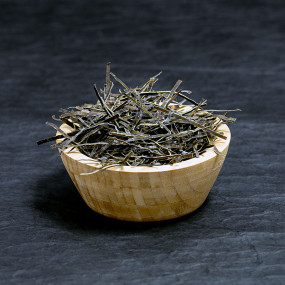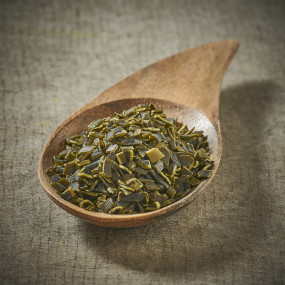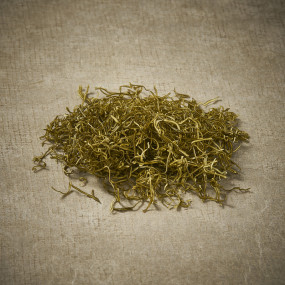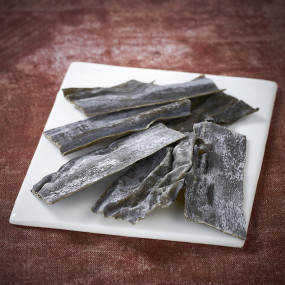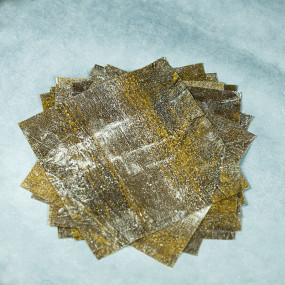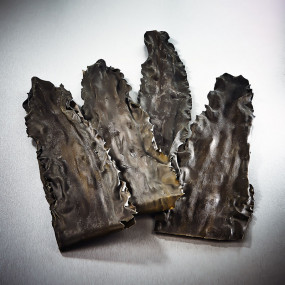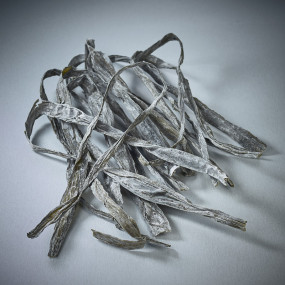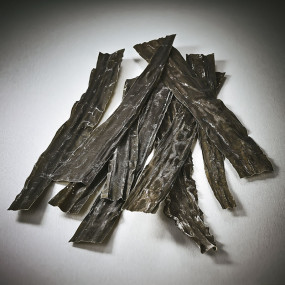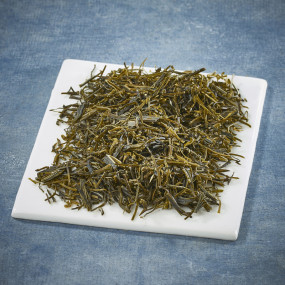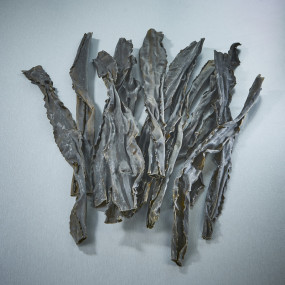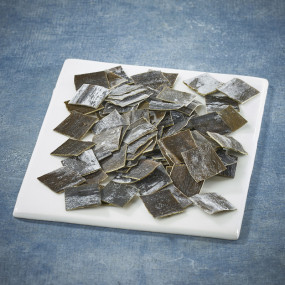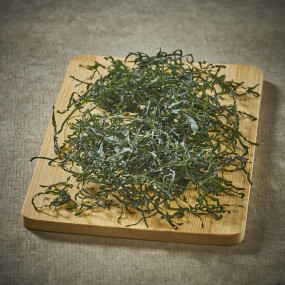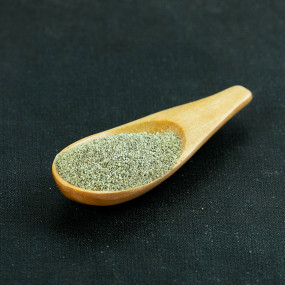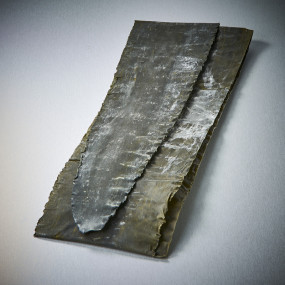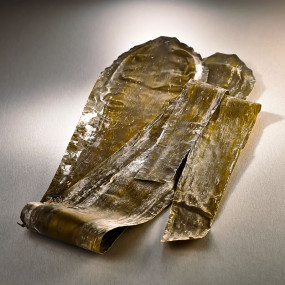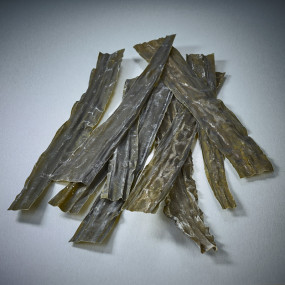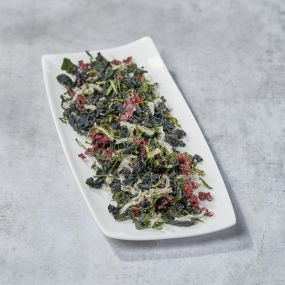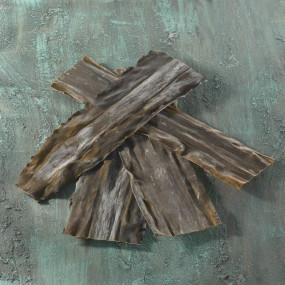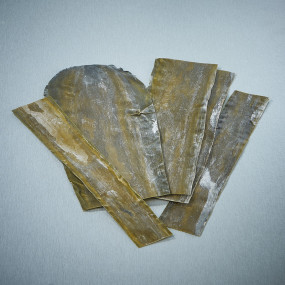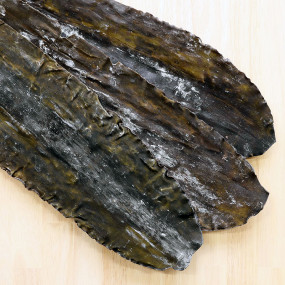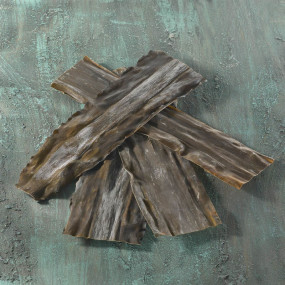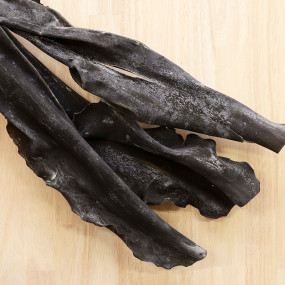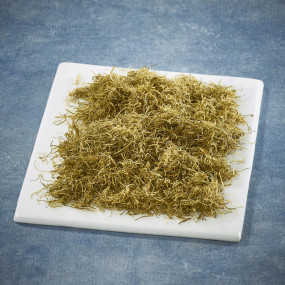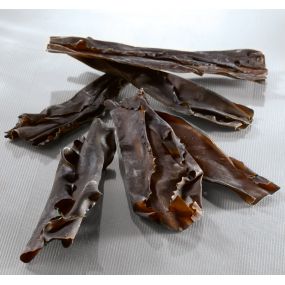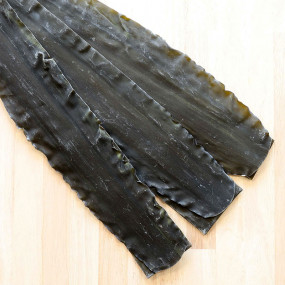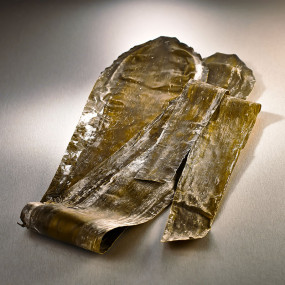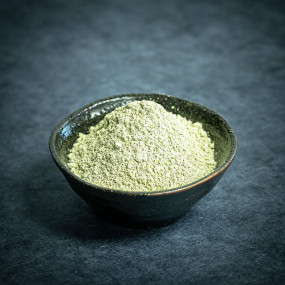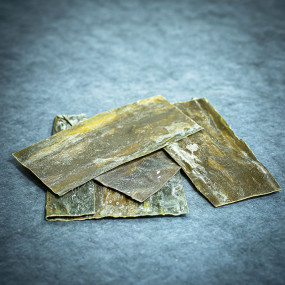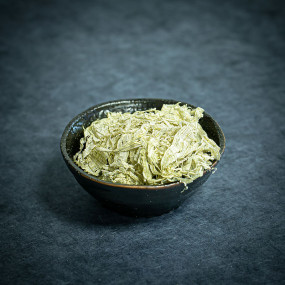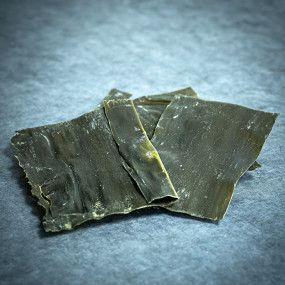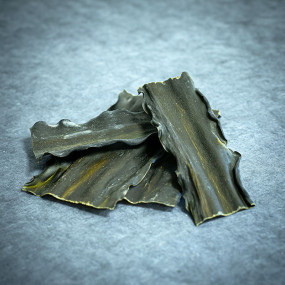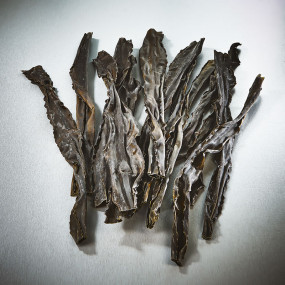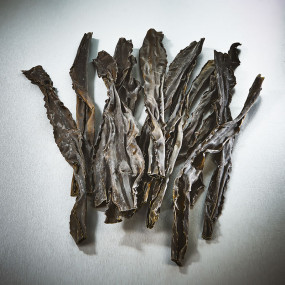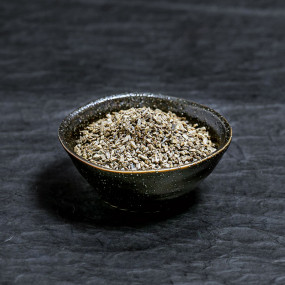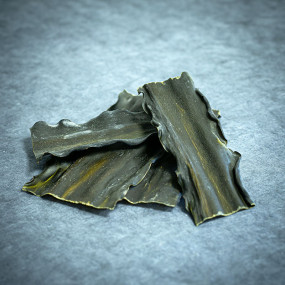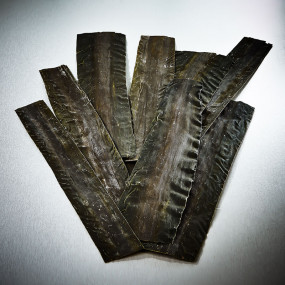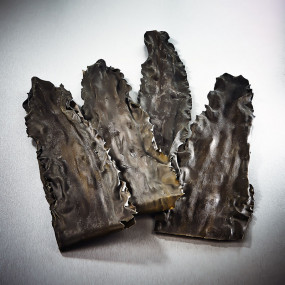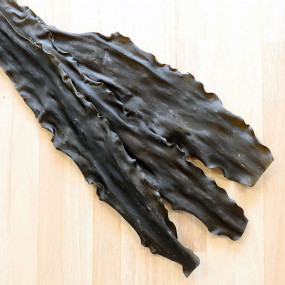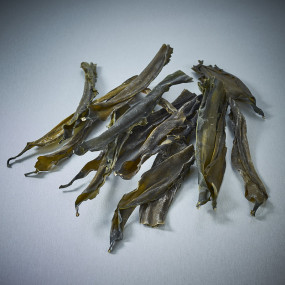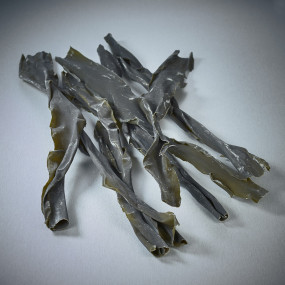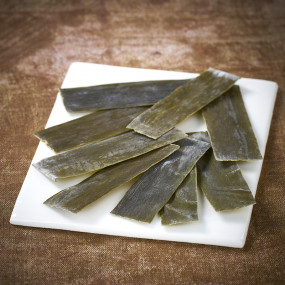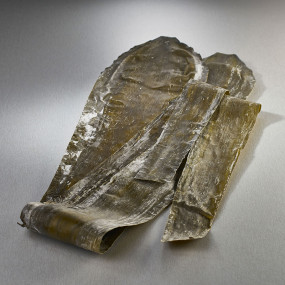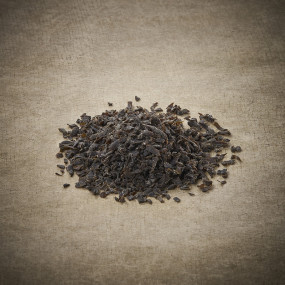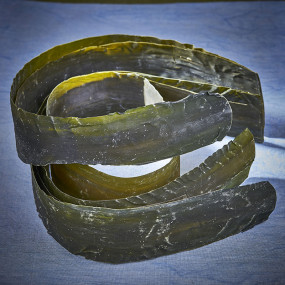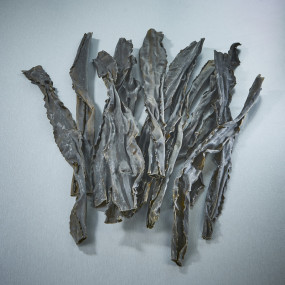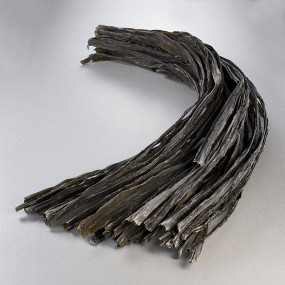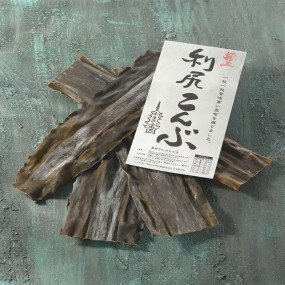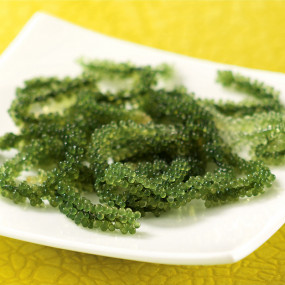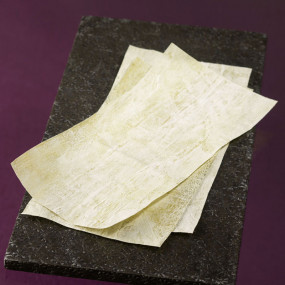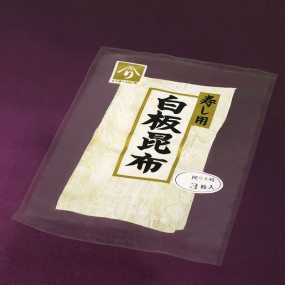Japanese Seaweeds
Seaweed is widely consumed in Japan, both for its incomparable iodine flavour and for its beneficial properties. Sushi, maki, miso soup, broths, salads... these sea vegetables are an essential part of Japanese cuisine, both traditionally and for the benefits they provide. Several varieties are eaten in Japan for different purposes.
Nori seaweed is best known in Europe for preparing maki and onigiri. Its iodised flavour and round mouthfeel can also be used in crumbs to season fish fillets, pasta, white rice, biscuits, etc. Kombu has a distinctive brown colour and can be used to season dishes or to make dashi broth, revealing umami, the emblematic flavour of Japanese cuisine. A real flavour enhancer, the 'kombujime' technique refines the flesh and delicately flavours the fish with the taste of kombu. Wakame, rich in flavour and usually cut into strips, is mainly used in soups, salads or stir-fries. Umibudo in the shape of bunches of miniature grapes is a delight when seasoned with Ponzu! Our fresh seaweed salads can be eaten on their own or as a side dish - a culinary voyage guaranteed!
These different types of edible seaweed, with their many virtues, are also very low in calories and contribute to healthy cooking. In Europe, these seaweeds are usually sold dehydrated. Just a few minutes is all it takes to rehydrate them and give these jewels of the sea all their iodised, umami-packed flavour.
Active filters
-
Rausu Kombu powder
- In stock
From €9.50Rausu kombu has a very soft fiber and is known for its broad and fine shape. When soaked in hot water, it gives a slimy, gooey texture and a rich umami flavor.
-
Hokkaido Sômen Kombu seaweed
- In stock
From €9.60Sômen Kombu, a real sea delight, are very young spring seaweeds, of just a year old.
-
Dried kombu seaweed, julienne cut
- In stock
From €10.00This kombu julienne is made from Hombaohirama kombu, a very long and wide seaweed.
This minced kombu seaweed, with light iodine notes, offers a very pleasant crunch.
It can be eaten hot or cold. Simple and quick to cook, kombu is an accompaniment. Simmered, it is satiating despite a very low number of calories.
In Japan, it is called "kiri konbu". -
-
Shredded Kombu seaweed
- In stock
From €5.30Shredded Kombu seaweed.
The flavors are natural, the texture is crispy. -
Oni or Rausu Kombu seaweed
- In stock
From €6.05Rausu Kombu is fragrant and sweet, producing a rich broth, with the typical color of the seaweed.
-
Kombu seaweeds leaves for kombujime
- In stock
From €19.95Kombujime is a technique used to enhance fish sashimi taste by aging the fish between two sheets of Kombu seaweed.
This technique is generally applied to white flesh fish (sea bream, sea bass, snapper, flounder...). -
Wild kombu seaweed from the Rishiri and Rebun islands,...
- In stock
From €115.00Kombu proposed here comes from the islands of Rishiri and Rebun, located in the north of Hokkaido Island, renowned for their wild kombu, the rarest and most qualitative in the world.
-
-
Wild kombu seaweed from the Rishiri and Rebun islands,...
- In stock
From €83.00Kombu proposed here comes from the islands of Rishiri and Rebun, located in the north of Hokkaido Island, renowned for their wild kombu, the rarest and most qualitative in the world.
-
Kizami shredded kombu seaweed
- In stock
From €65.20This grated kombu seaweed, with light iodine notes, offers a very pleasant crunch.
-
Hidaka kombu seaweed
- In stock
From €67.50Hidaka kombu seaweed, harvested south of Hokkaido, is a soft kombu, with sweet and iodized flavors.
-
Kagugiri ma kombu seaweed
- In stock
From €5.95The ma kombu seaweed is here cut into small squares with 2 cm sides.
-
Soft Kombu Seaweed salad from Hokkaido
- In stock
From €16.35The kombu used for this seaweed salad is a soft kombu, spaghetti shape. The flavors are delicately iodized, natural, the crunchy gourmand.
-
Seasoned grated Kombu seaweed
- In stock
From €15.85This finely grated kombu is made from the best Oni kombu (Saccharina Japonica) from Hokkaido, which are dry-aged for a long time and then finely ground to bring out their Umami taste immediately.
-
Premium Ma Kombu seaweed for Kobu-Jime
- In stock
From €84.00This ma kombu seaweed is thick, cut into rectangular sheets, long refined after being dried, to provide a maximum of flavors and umami.
-
Rausu Kombu powder
- In stock
From €9.50Rausu kombu has a very soft fiber and is known for its broad and fine shape. When soaked in hot water, it gives a slimy, gooey texture and a rich umami flavor.
-
Wild Rausu kombu seaweed
- In stock
From €96.00Rausu kombu has a very soft fiber and is known for its broad and fine shape. When soaked in hot water, it gives a slimy, gooey texture and a rich umami flavor. Rausu creates a very richly flavored dashi, with a darker brown color than Rishiri or Makombu dashi.
It is well used for Kobujime (raw fish refined by wrapping it in kombu) and Kobumaki (kombu rolls filled with cooked fish). -
Rishiri kombu seaweed
- In stock
From €96.00Rishiri kombu seaweed is consistently acclaimed by demanding Chefs.
-
Superior seaweeds salad
- In stock
From €13.00Real fruits or vegetables from sea, seaweeds, which beneficial effects as well as nutritional values are recognized all the over the world, are searched for, to be part of a healthy diet.
-
Wild Rishiri Kombu seaweed
- In stock
From €194.00These wild Rishiri Kombu seaweeds are cropped along the shores of Rishiri Island in Hokkaido. Their quality is recognized throughout Japan and beyond.
-
Cultivated Rausu kombu seaweed Extra grade
- In stock
From €137.00With its strong umami flavor and the most pronounced flavor among kombu, Rausu's kombu makes a slightly sweet broth.
-
Wild Honbaorihama Ma Kombu Premium seaweed from Hokkaido
- In stock
From €205.00Honbaorihama's makombu is of very high quality, rare, and considered an exceptional product and is among the top three kombu in Japan.
-
Unsorted wild Rishiri Kombu seaweed
- In stock
From €144.00These wild Kombu seaweeds were cropped along the seashores of Rishiri Island in Hokkaido.
-
Wild Kurokuchihama Ma Kombu Premium seaweed from Hokkaido
- In stock
From €171.00Kurokuchihama's makombu is of very high quality, rare, and considered an exceptional product and is among the top three kombu in Japan.
-
Kuro tororo kombu seaweed
- In stock
From €66.25This black shredded kombu seaweed heart is emblematic of Toyama. Families consume it daily.
-
Dried Kombu seaweed for Ma Kombu dashi stock
- In stock
From €20.35Ma kombu is the most appreciated and used kombu in Japan.
-
Wild Shirokuchihama Ma Kombu Premium seaweed from Hokkaido
- In stock
From €211.00Shirokuchihama's makombu is of very high quality, rare, and considered an exceptional product and is among the top three kombu in Japan.
-
-
Wild Rausu kombu seaweed, EXTRA quality
- In stock
From €96.00(2 reviews)Rausu kombu has a very soft fiber and is known for its broad and fine shape. When soaked in hot water, it gives a slimy, gooey texture and a rich umami flavor. Rausu creates a very richly flavored dashi, with a darker brown color than Rishiri or Makombu dashi.
It is well used for Kobujime (raw fish refined by wrapping it in kombu) and Kobumaki (kombu rolls filled with cooked fish). -
Rishiri and Rebun Islands kombu powder
- In stock
From €9.50Kombu offered here comes from the islands of Rishiri and Rebun, located in the north of Hokkaido Island, renowned for their wild kombu, the rarest and most qualitative in the world.
-
Rausu kombu seaweed
- In stock
From €7.20Rausu kombu has a very soft fiber and is known for its broad and thin shape. When soaked in hot water, it gives a slimy, gooey texture and a rich umami flavor. Rausu creates a very richly flavored dashi, with a darker brown color than Rishiri or Makombu dashi. It is well used for Kobujime (raw fish refined by wrapping it in kombu) and Kobumaki (kombu rolls filled with cooked fish).
-
Tororo kombu seaweed
- Available soon
From €8.80OKUI KAISEIDO's Tororo Kombu Seaweed is made from the finest Rausu Kombu. Rausu kombu has a very soft fiber and is known for its wide and thin shape. When soaked in hot water, it gives a slimy, gooey texture and a rich umami flavor.
-
Hidaka Kombu seaweed
- Available soon
From €5.50Hidaka kombu has soft fibers and is usually whole. This whole kombu is used for simmered dishes, Kobumaki (rolled kombu filled with cooked fish) and tsukudani condiments (kombu candied in a mixture of soy sauce, mirin, sake, sugar). It can create a darker brown, less sweet dashi with a strong kombu taste.
-
Ma kombu (Yamadashi) from Donan
- Available soon
From €6.20Ma kombu is a high quality kombu like Rishiri or Rebun. Its fiber is softer than Rishiri. It is mainly used in Osaka area, while Rishiri is popular in Kyoto. Makombu dashi has a rich golden color and a mild, sweet flavor.
-
Kura-gakoi cellar-aged kombu from Rishiri and Rebun islands
- Available soon
From €7.20Kombu proposed here comes from Rishiri and Rebun islands, located north of Hokkaido Island, renowned for their wild kombu, the rarest and most qualitative in the world.
Only a few privileged people have access to them and Okui Kaiseido, our artisan, is recognized in Japan as the absolute reference. -
Wild Hidaka Kombu seaweed, EXTRA quality
- Available soon
From €37.00Hidaka kombu has soft fibers and is usually whole. This whole kombu is used for simmered dishes, Kobumaki (rolled kombu filled with cooked fish) and tsukudani condiments (kombu candied in a mixture of soy sauce, mirin, sake, sugar). It can create a darker brown, less sweet dashi with a strong kombu taste.
-
Wild Hidaka Kombu seaweed, PREMIUM quality
- Available soon
From €66.00Hidaka kombu has soft fibers and is usually whole. This whole kombu is used for simmered dishes, Kobumaki (rolled kombu filled with cooked fish) and tsukudani condiments (kombu candied in a mixture of soy sauce, mirin, sake, sugar). It can create a darker brown, less sweet dashi with a strong kombu taste.
-
Seasoned shio kombu flakes
- Available soon
Shio kombu is made from julienne kombu which is usually soaked in soy sauce, mirin and sugar and then dried in the oven.
Shio kombu means « kombu salt ». -
Kombu from Rishiri and Rebun islands
- Available soon
From €7.20Kombu proposed here comes from Rishiri and Rebun islands, located north of Hokkaido Island, renowned for their wild kombu, the rarest and most qualitative in the world.
-
Wild Hidaka Kombu seaweed, PREMIUM quality
- Available soon
From €66.00Hidaka kombu has soft fibers and is usually whole. This whole kombu is used for simmered dishes, Kobumaki (rolled kombu filled with cooked fish) and tsukudani condiments (kombu candied in a mixture of soy sauce, mirin, sake, sugar). It can create a darker brown, less sweet dashi with a strong kombu taste.
-
Ma kombu (Yamadashi) seaweed PREMIUM quality from Donan
- Available soon
From €50.00Ma kombu, also called Yamadashi, is a high quality kombu such as Rishiri or Rebun. Its fiber is softer than that of Rishiri.
It is used mainly in Osaka area, while Rishiri is popular in Kyoto.
Makombu dashi has a rich golden color and a mild, sweet flavor.
Its shape is wider and thicker than the others. -
Hidaka Kombu seaweed
- Available soon
From €5.50Hidaka kombu has soft fibers and is usually whole. This whole kombu is used for simmered dishes, Kobumaki (rolled kombu filled with cooked fish) and tsukudani condiments (kombu candied in a mixture of soy sauce, mirin, sake, sugar). It can create a darker brown, less sweet dashi with a strong kombu taste.
-
Kura-gakoi cellar-aged wild kombu seaweed from the...
- Available soon
From €115.00Kombu proposed here comes from the islands of Rishiri and Rebun, located in the north of Hokkaido Island, renowned for their wild kombu, the rarest and most qualitative in the world.
Only a few privileged people have access to them and Okui Kaisedo, our artisan, is recognized in Japan as the absolute reference. -
Wild Kombu seaweed from Rishiri Island, Hokkaido
- Available soon
From €122.50Kombu from Rishiri Island, North Hokkaido, is very popular among Japanese cooks.
-
-
Bo kombu seaweed
- Available soon
From €63.00Bo kombu seaweed is widely used both by professionals and individuals
-
Ma Kombu seaweed
- Available soon
From €6.05Ma Kombu is the most popular and high quality Kombu. Possessing broad and thick leaves, it is the most appreciated. It has a refined sweetness and produces clear broths.
-
Rishiri Kombu seaweed
- Available soon
From €6.35Rishiri Kombu is sweet, saltier and harder than ma-kombu. Its dashi broth is rich, tasty and clear.
-
Premium Rausu Kombu seaweed
- Available soon
From €100.00Rausu Kombu we propose here is grown in Hokkaido: it is Hokkaido Rausu Kombu.
-
Ma kombu (Yamadashi) from Donan
- Available soon
From €6.20Ma kombu is a high quality kombu like Rishiri or Rebun. Its fiber is softer than Rishiri. It is mainly used in Osaka area, while Rishiri is popular in Kyoto. Makombu dashi has a rich golden color and a mild, sweet flavor.
-
Shio Kombu seaweed flakes
- In stock
From €73.00Shio Kombu is finely dried and minced kombu seaweed after being cooked in soy sauce, with salt and sugar, sometimes mirin.
The strips of Shio Kombu were cut here in flakes. -
-
Farmed Ma Kombu seaweed from Hokkaido
- Available soon
From €54.50This Ma Kombu, high quality, has been selected for its wide and thick leaves.
-
Hidaka Kombu seaweed from Hokkaido
- Available soon
From €61.00Hidaka kombu is as good to eat as it is to make dashi broth.
-
-
Extra wild Rishiri Kombu seaweed
- Available soon
From €22.20The Rishiri Kombu, from Rishiri Island in Hokkaïdo, is known as the best Kombu in Japan.
-
-
Planed Kombu seaweed with vinegar Shiroita Kombu 5 x 14 cm
- Available soon
From €11.00Cut in rectangular sheets, the kombu seaweed is ideal to cook fish in a foil or kombu jime. They are made out of the heart of the seaweed, very rich in flavors (umami) and with a soft texture.
-
Planed Kombu seaweed with vinegar Shiroita Kombu 11 x 20 cm
- Available soon
From €13.95The white seaweed sheet Shiroita Kombu is a kombu seaweed planed by hand (oboro kombu), harvested on Hokkaïdo Island and macerated in spirit vinegar for a whole day.
What are the benefits of wakame?
Japanese seaweed contains vitamins A, B and C and many minerals. Green seaweed stands out for its magnesium content and anti-inflammatory properties. Red seaweed is renowned for its moisturising, mineralising, anti-ageing, slimming and draining properties. Brown seaweed is antioxidant and detoxifying. Nori seaweed is rich in iron, amino acids and proteins.
In Japan, spirulina is eaten dried, or in powder or capsule form.
What kind of seaweed can I eat?
The Nishikidôri selection of Japanese seaweed includes only edible seaweed with recognised health benefits.
Is eating seaweed good for your health?
Seaweed is nutritionally rich, providing proteins, vitamins and minerals. Low in calories, it makes for healthy, high-quality cooking.
How do you eat seaweed?
Discover our selection of seaweed leaves to make sushi; powdered seaweed to enhance your dishes; crumbled seaweed to season your dishes and creations or wild, naturally dried and refined seaweed for Umami rich broths.
excluding specials

